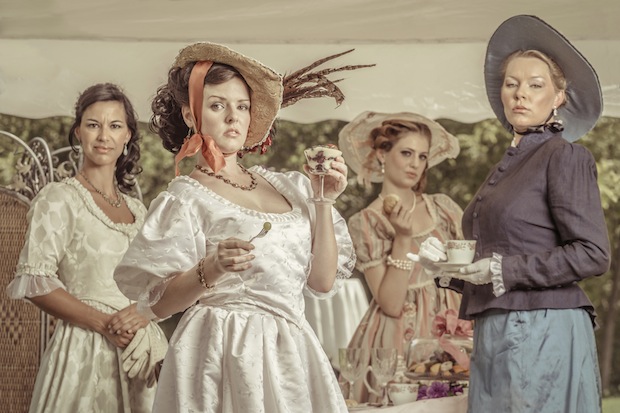I was having a nice telephone conversation with a friend the other day when I put my foot in it by suggesting that we might soon meet for a ‘meal’. ‘No,’ he said firmly. ‘Perhaps lunch or dinner?’ For a second I couldn’t think what he meant; but then it drifted back to me that there had once been a time — long, long ago — when I, too, might have been embarrassed by talk of a meal. For use of the word ‘meal’, clear and straightforward though it is, was thought ‘common’ or ‘non-U’ in those days, an indicator of social inferiority, though I cannot imagine why.
The terms ‘U’ and ‘non-U’ (‘U’ standing for ‘upper-class’) were coined in the 1950s by Professor Alan Ross, of Birmingham University’s linguistics department, but then made famous by Nancy Mitford in her essay ‘The English Aristocracy’, which included a glossary of words and phrases supposedly favoured by one class or the other. The ‘non-U’ words tended to be euphemistic and suggest middle-class aspirations to refinement, the ‘U’ words to be plain, direct and down-to-earth. But the whole thing felt suspiciously like an artificial construct by the upper class to boost its own sense of superiority and to protect it from infiltration by members of the class below.
I was brought up to believe myself more ‘U’ than ‘non-U’, but close enough to the latter to feel a degree of social unease and embarrassment at the use of ‘non-U’ words. (My mother didn’t help by describing our family as ‘upper middle-class’ or possibly ‘lower upper-class’, I can’t remember which.) But anyway, it’s quite different now. I am still easily embarrassed; not by people using ‘non-U’ expressions but, on the contrary, by people who still care about such things. I don’t wince at somebody saying ‘toilet’ instead of ‘lavatory’; I wince at somebody wincing at somebody else doing it. For what’s wrong with the word ‘toilet’ anyway? I remember when I first went to Italy that I heard some people using the word gabinetto instead of toiletta to describe a lavatory and immediately assumed that gabinetto must be the ‘U’ word for it. But in fact posh Italian people say toiletta and only lower-class ones say gabinetto. These are dangerous waters.
I admit that there are certain ‘non-U’ words in Nancy Mitford’s glossary that I don’t use. I don’t say ‘dress suit’ instead of ‘dinner jacket’ or ‘serviette’ instead of ‘napkin’ or ‘settee’ instead of ‘sofa’ or ‘lounge’ instead of ‘drawing-room’ (though I would normally say ‘sitting-room’ instead of ‘drawing-room’). But that’s just habit; and I certainly do use several other of her ‘non-U’ words, such as ‘mirror’, ‘mantelpiece’, ‘glasses’, ‘teacher’ and ‘ice cream’ (what on earth is wrong with ‘ice cream’?).
More than half a century has passed since Nancy Mitford wrote her essay, and language must have changed enormously during that period. Who knows how many of her ‘non-U’ words are still in use among the aspiring middle classes, and how many are now perfectly acceptable in the grandest circles? Language changes all the time, and hundreds of Americanisms once considered barbaric on this side of the Atlantic are now not even regarded as Americanisms. In the 18th century, the American verb ‘to belittle’ was considered in England to be the height of vulgarity. This seems extraordinary now.
And apart from all that, do we still have an upper class? And if so, who are its members? In addition to the old English aristocracy and landed gentry (what’s left of it) they must surely include the new rich, the Russian oligarchs and so on, who may now rank as high as anyone in society. And if these different kinds of people now comprise the upper class, they are hardly bound together by language, since they all speak it in different ways. All this is rather liberating for someone like me who was brought up to believe in the importance of the class distinctions that Nancy Mitford described. I am still old-fashioned in many ways. I believe in punctuation and verbs in sentences. But the concepts of ‘U’ and ‘non-U’ now feel meaningless. It’s hard to eliminate snobbery completely, however, and what’s left of mine is now directed principally against those who still cling to their Mitfordian illusions and get very cross when their children ask if they can go to the toilet.
Got something to add? Join the discussion and comment below.
Get 10 issues for just $10
Subscribe to The Spectator Australia today for the next 10 magazine issues, plus full online access, for just $10.
You might disagree with half of it, but you’ll enjoy reading all of it. Try your first month for free, then just $2 a week for the remainder of your first year.













Comments
Don't miss out
Join the conversation with other Spectator Australia readers. Subscribe to leave a comment.
SUBSCRIBEAlready a subscriber? Log in